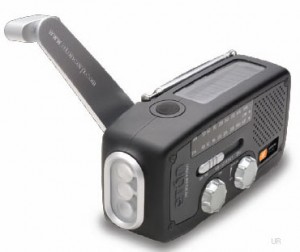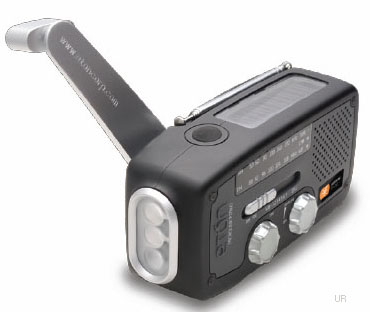Thanks to the Southgate ARC for bringing this to my attention:
The radio this reporter demonstrates is a shortwave version of the Eton FR160.
Tag Archives: Shortwave Radio Ban
Zimbabwe: door-to-door search for radios
 (Source: SW Radio Africa)
(Source: SW Radio Africa)
On Friday police in Rusape went door-to-door to houses belonging to known MDC-T supporters, in search of shortwave radios. But the MP for Makoni South said they found nothing.
Pishai Muchauraya said the morning raids saw police officers go in groups of three to MDC-T homes in Gandanzara, ‘demanding radios distributed by Pishai.’
[…]Last week the police ordered a ban on the possession of shortwave radios, saying they are being used to communicate hate speech ahead of next month’s constitutional referendum and elections set to be held later this year.
Wind-up, solar-powered radios sets have been distributed by some NGOs to rural communities, where villagers have established listening clubs to tune in to popular independent stations such as Studio 7 and SW Radio Africa. The broadcasts are produced by experienced exiled Zimbabwean journalists based in Europe and the US.
Read the full report on the website of clandestine radio station, SW Radio Africa.
Media Institute of Southern Africa reacts to Zimbabwe shortwave receiver ban

The shortwave Eton Microlink FR160 is one of the noted “specially-designed radios” capable of receiving international broadcasts (like those from the Voice of America) which might compete with state-owned stations.
International broadcasters (and those cutting their budgets) should ask themselves the following question:
If shortwave radio is no longer relevant in today’s high-tech world, why are these radios suddenly being banned in a country controlled by a repressive regime?
The government of Zimbabwe apparently fears the little self-powered shortwave radio you see on the right. —>
Read the Media Institute of Southern Africa’s reaction to the radio ban in the Huffington Post:
(Source: Huffington Post)
Media freedom campaigners said Friday police in Zimbabwe are breaking the law by seizing and banning small radio receivers that can tune in to stations not linked to the state broadcasting monopoly controlled by President Robert Mugabe’s party.
The Media Institute of Southern Africa said Friday no regulations outlaw the hand-cranked, solar powered radios that democracy and election support groups plan to use ahead of a referendum on a new constitution next month and crucial elections later in the year. Police insist the radios and cheap Chinese 3G smartphones with GPS capability are being supplied by “subversive organizations” and pose a security threat surrounding the polling.
[…]”The importance of a radio set cannot be overemphasized as it is a generally affordable legal gadget used for receiving information by the public,” the group said.
Police efforts to “criminalize the distribution and possession of the radio sets” infringed citizens constitutional rights to freedom of expression and basic civil liberties,” it said.
Such radios and other equipment were seized in recent police raids on the Zimbabwe Peace Project, a human rights group that monitors political violence, and the independent Zimbabwe Election Support Network.
Police allege those and other groups were planning to mobilize “recruits” with unauthorized communications devices in rural districts across the country, traditionally voting strongholds of Mugabe’s party.
The Elton [Eton, actually] Microlink radio, at a cost of about $30, has channels able to receive Voice of America broadcasts beamed in from neighboring Botswana and shortwave broadcasts on Zimbabwe from Europe.
The state Zimbabwe Broadcasting Corp. has four radio stations fiercely loyal to Mugabe. State and independent newspapers are not commonly found in impoverished rural districts where communities rely for information on radios only receiving state radio and powered by batteries that are often in short supply.
Police warned this week that the activities of some Western-backed non-governmental organizations and rights groups now verged on espionage. People found in remote areas with the cited devices could face arrest.
They said the “specially designed radios are not compatible with state-owned radio stations” and could inflame election tensions by promoting hate speech.[…]
